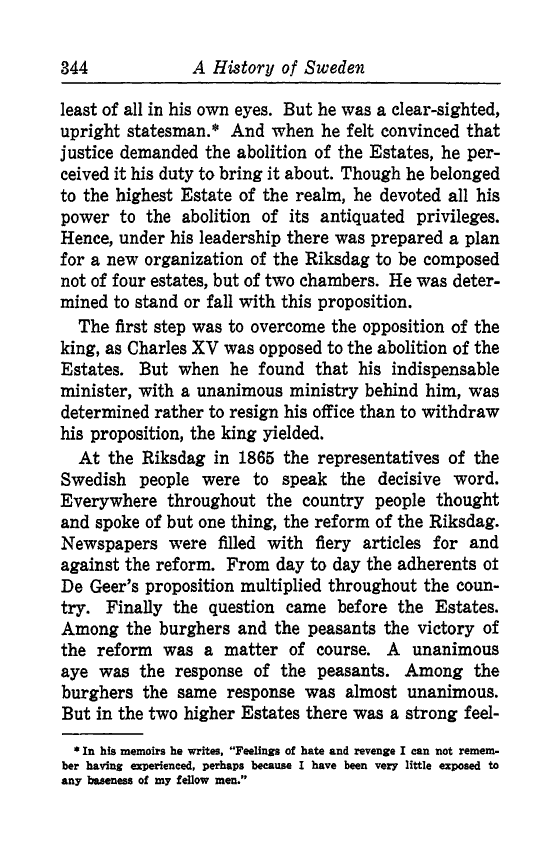
Full resolution (TIFF) - On this page / på denna sida - XXI. Political and Social Progress - A. Establishment of a Riksdag of Two Chambers

<< prev. page << föreg. sida << >> nästa sida >> next page >>
Below is the raw OCR text
from the above scanned image.
Do you see an error? Proofread the page now!
Här nedan syns maskintolkade texten från faksimilbilden ovan.
Ser du något fel? Korrekturläs sidan nu!
This page has never been proofread. / Denna sida har aldrig korrekturlästs.
344 A History of Sweden
least of all in his own eyes. But he was a clear-sighted,
upright statesman.* And when he felt convinced that
justice demanded the abolition of the Estates, he per-
ceived it his duty to bring it about. Though he belonged
to the highest Estate of the realm, he devoted all his
power to the abolition of its antiquated privileges.
Hence, under his leadership there was prepared a plan
for a new organization of the Riksdag to be composed
not of four estates, but of two chambers. He was deter-
mined to stand or fall with this proposition.
The first step was to overcome the opposition of the
king, as Charles XV was opposed to the abolition of the
Estates. But when he found that his indispensable
minister, with a unanimous ministry behind him, was
determined rather to resign his office than to withdraw
his proposition, the king yielded.
At the Riksdag in 1865 the representatives of the
Swedish people were to speak the decisive word.
Everywhere throughout the country people thought
and spoke of but one thing, the reform of the Riksdag.
Newspapers were filled with fiery articles for and
against the reform. From day to day the adherents ot
De Geer’s proposition multiplied throughout the coun-
try. Finally the question came before the Estates.
Among the burghers and the peasants the victory of
the reform was a matter of course. A unanimous
aye was the response of the peasants. Among the
burghers the same response was almost unanimous.
But in the two higher Estates there was a strong feel-
* In his memoirs he writes, "Feelings of hate and revenge I can not remem-
ber having experienced, perhaps because I have been very little exposed to
any baseness of my fellow men."
<< prev. page << föreg. sida << >> nästa sida >> next page >>